How to Kick Off Remote Performance Reviews
Find out our best practices for running remote performance reviews, and how to successfully kick off the process for your organization.
Remote performance reviews, are they necessary?
The transition to remote working has transformed performance management. Whilst some organizations have abandoned performance reviews altogether, receiving regular feedback remains crucial to employee growth and development. In this webcast, we delve into remote performance reviews, exploring the importance and implications of reviews for office and remote workers and our best practices to help you kick off remote performance reviews process.
Embedded content: https://www.youtube.com/embed/40Orm61wwBs
Introduction to performance reviews
Performance reviews are a talent engagement process which ensures a set of activities and outputs meet the company's objectives. They provide direction to employees and increase accountability, guiding them to meet their individual objectives, as well as align them with the wider organizational objectives.
HR leaders have begun to realize that a fixed, one-size-fits all approaches to performance reviews can inhibit performance, rather than improve it. Subsequently, there has been an increasing demand flexibility and agility within the review process.
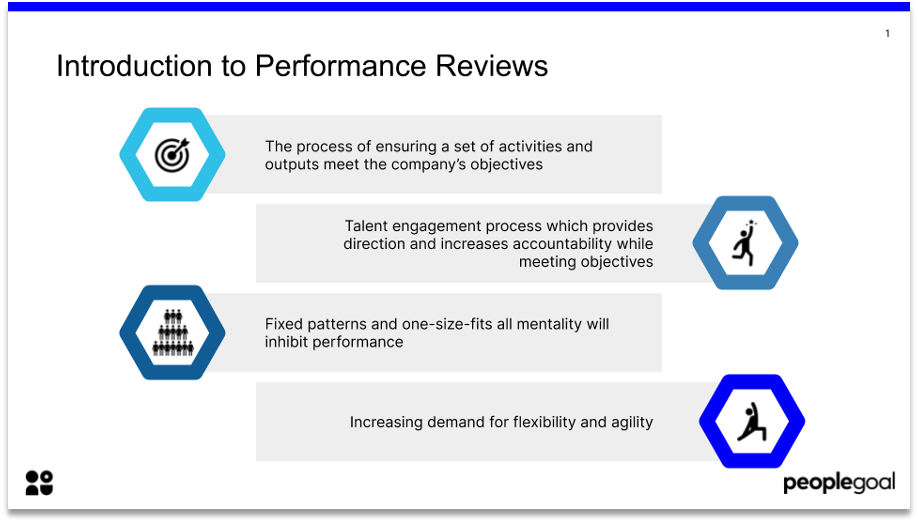
The importance of performance reviews for office and remote workers
Performance reviews are crucial for both office and remote workers. In terms of office performance reviews, the key benefit is the opportunity to have a face-to-face catch up between the manager and employee. Since the shift to remote work, this is no longer possible, but it is still really important to keep the performance review process in place to close potential communication gaps that are experienced by remote teams.
Performance reviews are also important for remote teams as they provide a sense of normalcy. The way we work has been transformed, and the routine nature of recurring processes can reassure remote workers, keeping them aligned despite the remote environment.
Despite these differences, both office and remote workers share the principal benefits of performance reviews. They measure employee achievement and celebrate accomplishments as well as provide an opportunity to receive meaningful feedback and voice any concerns. These discussions can lead to compensation, promotion or development which is vital in terms of succession planning. Finally, regular review processes can strengthen company culture and reinforce values by creating alignment throughout the organization and building stronger working relationships.
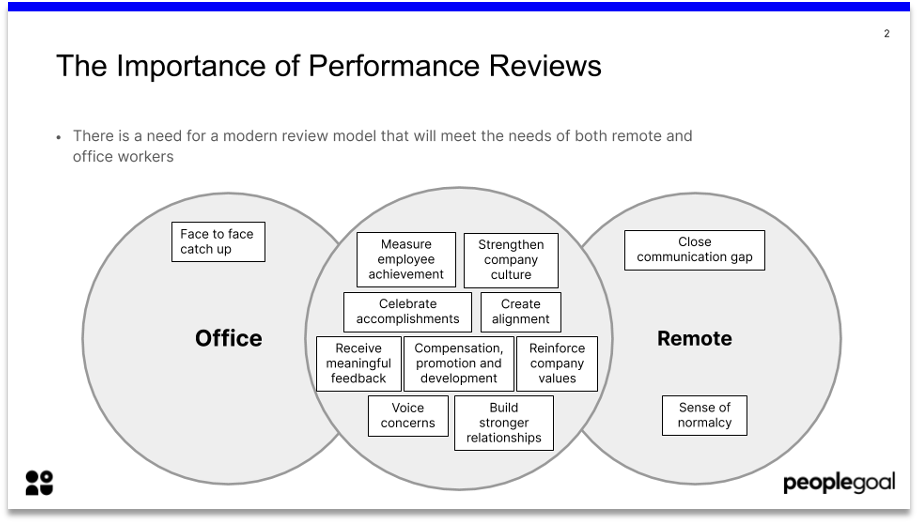
The "extra" implications for remote workers
Remote working has affected all people processes, however it has had the most impact on performance reviews. Even at the best of times performance reviews can be tense, stressful and anxiety inducing, and whilst working from home they present a greater challenge.
Communication can become fragmented as the team works at home, and employees might not be as productive due to the time taken to adjust to working from home. Moreover, people have been impacted unevenly by the pandemic, therefore reviewing all employees by the same standards does not take into account difficult personal circumstances, like care giving responsibilities.
In addition, last years performance targets might now be unrealistic or irrelevant, so there is a need to adjust performance reviews to account for the realignment of goals. Last but not least, the mix of remote and office workers within an organization might further complicate the reviews process as a one-size-fits all approach will no longer cover the company's needs.
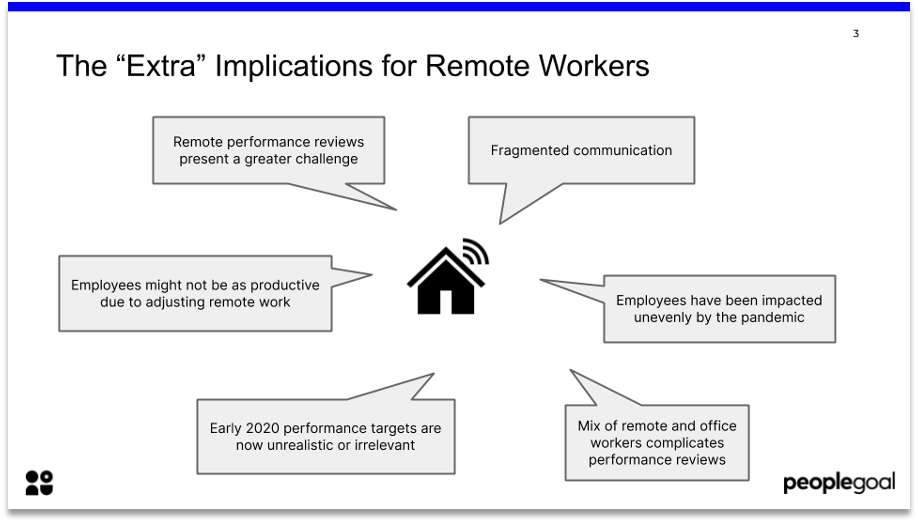
5 best practices for remote performance reviews
1. Performance reviews should be goal-based
Goal-based assessments are a really useful way to run performance reviews because they create alignment between employees, managers and the wider organization, as well as remove any ambiguity from the process.
It is advisable to implement a robust system of goal-setting for employees, for example SMART goals or OKRs, and then centre reviews around employee progress. Having a clear methodology will help ensure that there is an equal approach to performance reviews, in the sense that every employee will have the opportunity to set and achieve ambitious goals.
In addition, managers should link performance reviews to company targets and culture, so that employees feel that they are contributing to the organization's overall success.
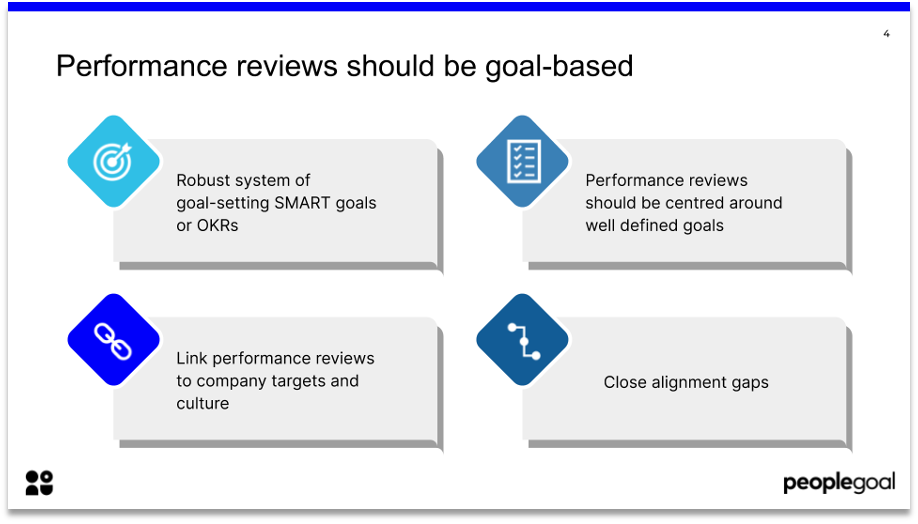
2. Set shorter time frames
There is a growing need for shorter performance review time frames. Employee roles are changing rapidly to respond to changing world events, therefore their goals need to change as well. More frequent evaluations will provide managers with the opportunity to give meaningful feedback and quickly make adjustments to help their employees grow and develop.
It is important to train managers to have regular feedback sessions with their employees. With everyone working remotely, this is most likely the first time that some people are managing remote teams. Therefore it is vital that you help mangers to support their teams.
Replace the annual performance review process with an agile, continuous feedback system where you run performance reviews bi-annually or even better, quarterly.
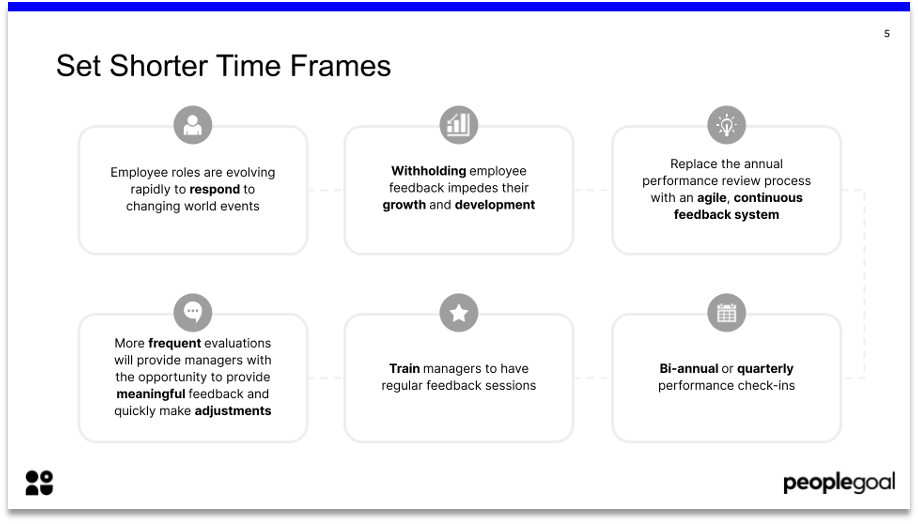
3. Run performance reviews virtually
It is not wise to delay the performance review process until you are able to meet employees in person. This can further delay feedback and lead to deterioration of productivity and performance. Therefore, we advise you to run your performance reviews virtually. Whilst this may seem difficult at first, by planning appropriately a virtual performance review can be just as successful as an in-person one.
First of all, it is important to set an agenda to establish the topics that will be covered in the meeting. Set a structure and facilitate coherent communication. Secondly, a performance management system will help define and track employee goals, establish productivity metrics and tie performance with outcomes instead of output. This works especially well for remote workers.
Make sure you turn video on. Face to face communication is the key to establishing trust, reading body language, and having a positive review experience. Next, it is important to practice active listening in order to achievement alignment and ensure that everyone is on the same page. Finally, dedicate some time for small-talk. Having a few minutes to discuss topics unrelated to work will release tension and make the process more enjoyable for both the manager and the employee.
Just because its performance reviews are virtual doesn't mean they have to be impersonal
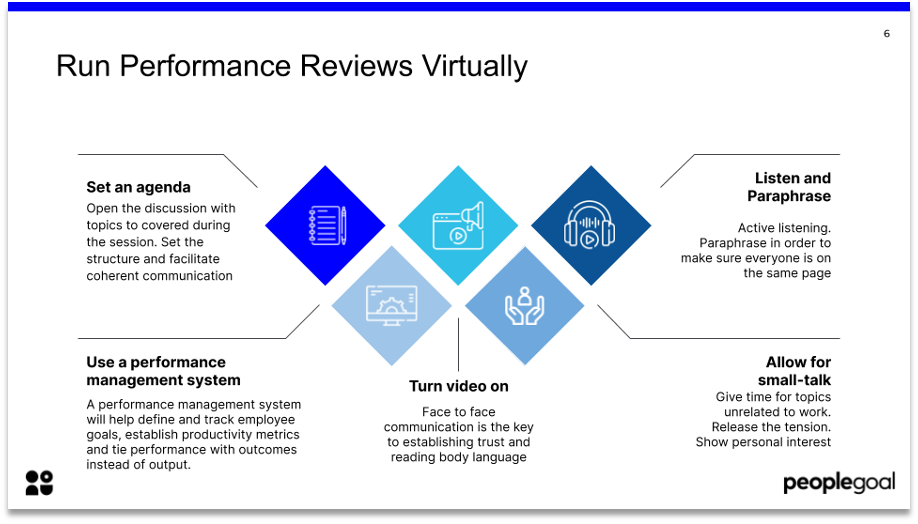
4. Evaluate desired behaviors
This years performance reviews need to be much more flexible and empathetic. Rating employees is going to be difficult because for many objective reasons some employees are unable to give 100%. Instead of giving a numerical performance rating, create a flexible system that recognizes the hardships that many are enduring, and run a narrative assessment based on relevant behaviours.
Performance reviews need to start measuring employees' remote working skills and competencies, such as remote collaboration and communication, and the ability to self start. There is also demand for behaviors that will help the organization pivot and innovate, for example agility, innovation, creativity, adaptability and resilience.
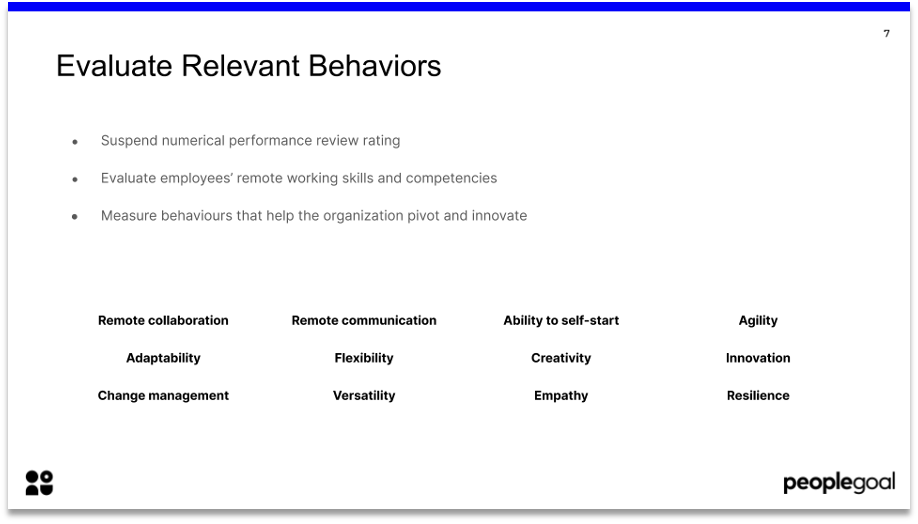
5. Use performance reviews as a development opportunity
Lead performance reviews with empathy and compassion, and make your review process people-centric. Targets set last year before Covid-19 are no longer applicable. It would be unfair to judge your employees against the company's pre-pandemic objectives. Instead, concentrate on employee growth and learning, making the most of the opportunity to develop your employees into the strongest performers possible.
Whilst it is important to consider past performance, focus the majority of the review on goal-setting and discussing future projects. Be optimistic about the future, and how employees can further improve. Running performance reviews this way will ultimately strengthen your organization's culture and reinforce its values.
Performance reviews should be a positive experience for both managers and employees. They are an opportunity to grow your people and your organization.
Now is not the time to be reprimanding employees for poor performance. Instead, if an employee is not hitting their targets, ask them why. There might be a very good reason for it.
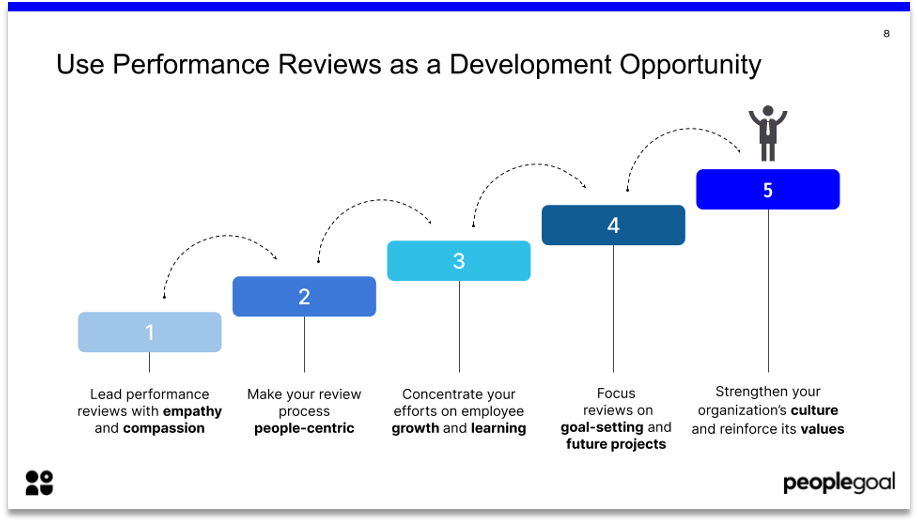
How to Kick off Remote Performance Reviews
As an employee, start thinking about what you have done over the year. What have you achieved? What could you have done better? Keep a work journal, and complete a self-evaluation.
As a manager, review the team and employee goals and check if they are completed. It is also useful to set up virtual 1-1s to discuss performance. Finally, the HR department needs to communicate changes to the review process to managers and employees in good time, so that they can follow the new guidelines accordingly, and ensure that managers et up virtual 1-1s.
The whole organization needs to come together to make the remote performance reviews a success. From employees, to managers, to senior leaders to HR.
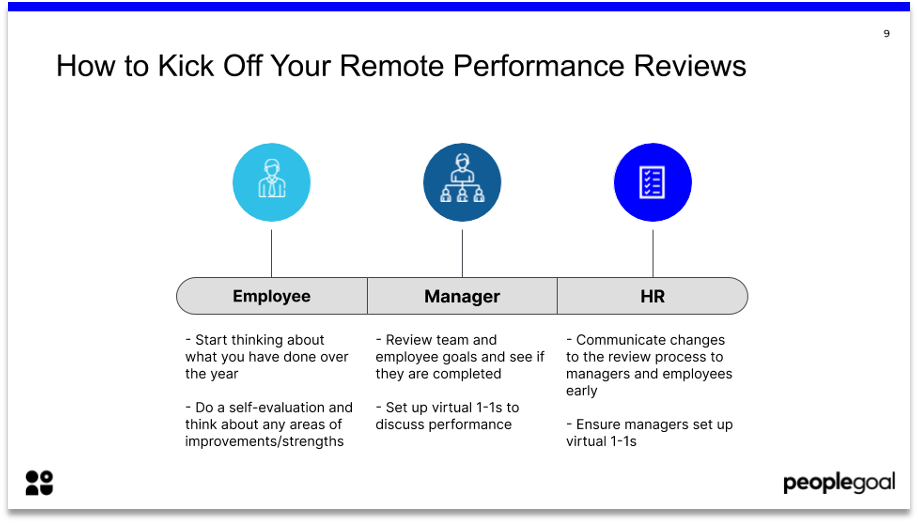
Key takeaways
- There is a need for a modern review model that will meet the needs of both remote and office workers
- Remote performance reviews should be goal-based
- Set shorter time frames
- Run performance reviews virtually
- Evaluate behaviors that are relevant to the remote environment
- Use remote performance reviews primarily as a development opportunity
Want to learn more?
Enjoyed learning about remote performance reviews? Check out the full webcast here and check out our article Top Tips to Kick Off Remote Performance Reviews in 2020.
Catch up with our previous webcasts on remote goal setting below:
Need some help kicking off your remote performance review process? Book a demo with PeopleGoal here.
